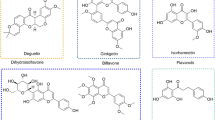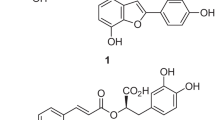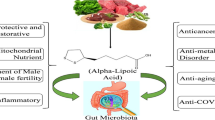Abstract
Background
Malignancy of the prostate constitutes a leading cause of cancer-related deaths in America and Europe. Alpha-tocopheryl succinate (α-TOS) has been shown to inhibit human prostate cancer growth in vitro, via several mechanisms, including inhibiting prostate-specific antigen (PSA) and vascular endothelial growth factor (VEGF) expressions. The route of α-TOS administration has a profound effect on its antitumor activity, and few studies have investigated its effects on prostate cancer growth in vivo.
Aim of the Study
The present study tested the hypothesis that α-TOS wil reduce the growth of human prostate LNCaP tumors in mice fed low (7%) and high (20%) levels of dietary soybean oil, compared to the controls receiving vehicle, by modulating PSA and VEGF gene expressions in the tumor tissue.
Methods
BALB/c nude mice (n = 42) were subcutaneously inoculated with 1 × 106 LNCaP cells and assigned to one of four dietary groups; 7% or 20% soybean oil diet with or without α-TOS treatment. Three weeks later, mice received daily intraperitoneal injections of α-TOS (100 mg/kg body weight) in sesame seed oil (SSO) for two weeks; controls received SSO injections. Tumor volumes were recorded weekly. Sera, liver, and tumor tissues were collected at seven weeks for serum PSA, testosterone and α-tocopherol analyses, histopathological examination, and reverse transcription and polymerase chain reaction (RT-PCR) amplification of PSA and VEGF gene fragments in tumors. Relative quantification of gene expression was performed using real-time PCR. P ≤ 0.05 was considered significant.
Results
Intraperitoneal injections of α-TOS caused decreased tumor growth in both groups (7% and 20% fat, P < 0.05), versus controls. α-TOS treatment significantly reduced serum PSA and testosterone levels in comparison to the SSO-treated controls (P < 0.05). Control tumors had a greater degree of angiogenesis than α-TOS tumors, as demonstrated by the greater number of blood-filled vessels. PSA and VEGF mRNA expressions, were also reduced with α-TOS treatment (P < 0.05), revealing the possible molecular mechanisms of growth inhibition of LNCaP xenografts by α-TOS.
Conclusions
Our study shows significant reduction in LNCaP xenograft growth with α-TOS treatment in nude mice fed a low (7%) and high (20%) fat soybean oil diets versus controls. Serum PSA and testosterone, tumor angiogenesis, and PSA and VEGF mRNA expressions were markedly reduced by α-TOS administration, suggesting a possible role of α-TOS as a chemotherapeutic agent in human prostate cancer, and warrants further investigations on the dose and delivery of α-TOS in humans.




Similar content being viewed by others
References
American Cancer Society. Cancer Facts & Figures 2005 http://www.cancer.org/docroot/STT/stt_0.asp [accessed June 2006]
Granado de la OS, Saa RC, Quintas VA (2006) Epidemiological situation of prostate cancer in Spain. Actas Urol Esp 30:574–582
Sogani PC, Whitmore WF (1988) Flutamide and other antiandrogens in the treatment of advanced prostatic carcinoma. Cancer Treat Res 39:131–145
Willis MS, Wians FH (2003) The role of nutrition in preventing prostate cancer: a review of the proposed mechanism of action of various dietary substances. Clin Chim Acta 330:57–83
Ripoll EA, Rama BN, Webber MM (1986) Vitamin E enhances the chemotherapeutic effects of adriamycin on human prostatic carcinoma cells in vitro. J Urol 136:529–531
Israel K, Yu W, Sanders BG, Kline K (2000) Vitamin E succinate induces apoptosis in human prostate cancer cells: role for Fas in vitamin E succinate-triggered apoptosis. Nutr Cancer 36:90–100
Yu A, Somasundar P, Balsubramaniam A, Rose AT, Vona DL (2002) Vitamin E and the Y4 agonist BA-129 decrease prostate cancer growth and production of vascular endothelial growth factor. J Surg Res 105:65–68
Zhang Y, Ni J, Messing EM, Chang E, Yang CR (2002) Vitamin E succinate inhibits the function of androgen receptor and the expression of prostate-specific antigen in prostate cancer cells. Proc Natl Acad Sci USA 99:7408–7413
Zhang M, Altuwaijri S, Yeh S (2004) RRR-α-tocopheryl succinate inhibits human prostate cancer cell invasiveness. Oncogene 23:3080–3088
Zu K, Ip C (2003) Synergy between selenium and vitamin E in apoptosis induction is associated with activation of distinctive initiator caspases in human prostate cancer cells. Cancer Res 63:6988–6995
Venkateswaran V, Fleshner NE, Sugar LM, Klotz LH (2004) Antioxidants block prostate cancer in Lady transgenic mice. Cancer Res 64:5891–5896
Neuzil J (2003) Vitamin E succinate and cancer treatment: a vitamin E prototype for selective antitumor activity. Br J Cancer 89:1822–1826
Malafa MP, Neitzel LT (2000) Vitamin E succinate promotes breast cancer tumor dormancy. J Surg Res 93:163–170
Reeves PG, Nielsen FH, Fahey GC (1993) AIN-93 purified diets for laboratory rodents: final report of the American Institute of Nutrition Ad Hoc Writing Committee on the reformulation of the AIN-76A rodent diet. J Nutr 123:1939–1951
Devaraj S, Jialal I (2000) Low-density lipoprotein postsecretory modification, monocyte function, and circulating adhesion molecules in type 2 diabetic patients with and without macrovascular complications: the effect of alpha-tocopherol supplementation. Circulation 102:191–196
Hara A, Radin N (1978) Lipid extraction of tissues with a low-toxicity solvent. Annal Biochem 90:420–426
Edelstein RA, Krane RJ, Babayan RK, Morenas A, Moreland RB (1995) A rapid and simple method for the detection of prostate-specific antigen mRNA in archival tissue specimens using a reverse transcription-polymerase chain reaction assay. Urology 45:597–603
Collado B, Gutierrez-Canas I, Rodriguez-Henche N, Prieto JC, Carmena MJ (2004) Vasoactive intestinal peptide increases vascular endothelial growth factor expression and neuroendocrine differentiation in human prostate cancer LNCaP cells. Regul Pept 119:69–75
Eder IE, Culig Z, Ramoner R, Thurnher M, Putz T (2000) Inhibition of LNCaP prostate cancer cells by means of androgen receptor antisense oligonucleotides. Cancer Gene Ther 7:997–1007
Jacklin A, Ratledge C, Welham K, Bilko D, Newton CJ (2003) The sesame seed oil constituent, sesamol, induces growth arrest and apoptosis of cancer and cardiovascular cells. Ann N Y Acad Sci 1010:374–380
Fleshner N, Fair WR, Huryk R, Heston WDW (1999) Vitamin E inhibits the high-fat diet promoted growth of established human prostate LNCaP tumors in nude mice. J Urol 161:1651–1654
Mukherjee P, Sotnikov AV, Mangian HJ, Zhou JR, Visek WJ (1999) Energy intake and prostate tumor growth, angiogenesis, and vascular endothelial growth factor expression. J Natl Cancer Inst 91:512–523
Wang Y, Corr JG, Thaler HT, Tao Y, Fair WR (1995) Decreased growth of established human prostate LNCaP tumors in nude mice fed on low-fat diet. J Natl Cancer Inst 87:1456–1461
Barnett KT, Fokum FD, Malafa MP (2002) Vitamin E succinate inhibits colon cancer liver metastases. J Surg Res 106:292–298
Gilbert VA, Zebrowski EF, Chan AC (1983) Differential effects of mega vitamin E on prostacyclin and thromboxane synthesis in streptozotocin-induced diabetic rats. Horm Metab Res 15:320–325
Hartman TJ, Dorgan JF, Virtamo J (1999) Association between serum alpha-tocopherol and serum androgens and estrogens in older men. Nutr Cancer 35:10–15
Aronson WJ, Tymchuk CN, Elashoff RM (1999) Decreased growth of human prostate LNCaP tumors in SCID mice fed a low-fat, soy protein diet with isoflavones. Nutr Cancer 35:130–136
Thalmann GN, Sikes RA, Chang SM (1996) Suramin-induced decrease in prostate-specific antigen expression with no effect on tumor growth in the LNCaP model of human prostate cancer. J Natl Cancer Inst 88:794–801
Weber T, Lu M, Andera L, Lahm H, Gellert N, Fariss MW, Korinek V, Sattler W, Ucker DS, Terman A, Schroder A, Erl W, Brunk UT, Coffey RJ, Weber C, Neuzil J (2002) Vitamin E succinate is a potent novel antineoplastic agent with high selectivity and cooperativity with tumor necrosis factor-related apoptosis-inducing ligand (Apo2 ligand) in vivo. Clin Cancer Res 8:863–869
Acknowledgements
The authors thank Dr. Veera Arora at UTSouthwestern Medical Center. This study was jointly funded by the Human Nutrition Fund, Texas and the Research Enhancement Program (REP) at Texas Woman’s University.
Author information
Authors and Affiliations
Corresponding author
Additional information
This research work won three best poster awards at Experimental Biology 2005 (San Diego, CA, USA), at three different Research Interest Sections (RIS) competitions, organized by the American Society for Nutritional Sciences (ASNS)- Diet & Cancer RIS, Vitamin & Mineral RIS, Nutrient-Gene RIS.
Rights and permissions
About this article
Cite this article
Basu, A., Grossie, B., Bennett, M. et al. Alpha-tocopheryl succinate (α-TOS) modulates human prostate LNCaP xenograft growth and gene expression in BALB/c nude mice fed two levels of dietary soybean oil. Eur J Nutr 46, 34–43 (2007). https://doi.org/10.1007/s00394-006-0629-4
Received:
Accepted:
Published:
Issue Date:
DOI: https://doi.org/10.1007/s00394-006-0629-4




